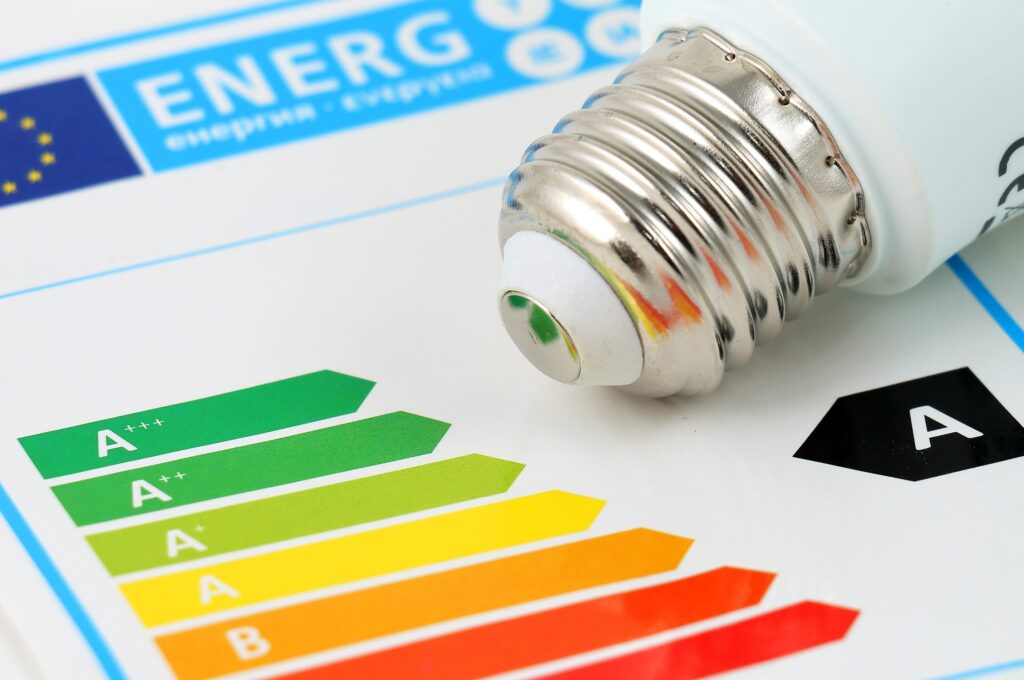Energy efficiency of our homes is a big issue.
In fact, the government has set a major target for all UK homes to have no lower than a ‘C’ rating on their Energy Performance Certificate (EPC) by 2025.
For landlords, rules on the energy efficiency of their properties are tightening, too.
So, what can you do to improve your property’s EPC rating?
In this guide, we’ll reveal some cost-effective steps you can take, as well as more major work that will boost your home’s EPC score…
What is an EPC rating?
Energy Performance Certificate (EPC) ratings show how energy efficient a property is, based on a scale of A to G.
The ‘G’ rating refers to the lowest energy efficiency, while an ‘A’ rating refers to the highest.
EPCs also provide score bandings for each rating:
- Band A – 92 plus (most efficient)
- Band B – 81 to 91
- Band C – 69 to 80
- Band D – 55 to 68
- Band E – 39 to 54
- Band F – 21 to 38
- Band G – 1 to 20 (least efficient)
The average rating for a property in England and Wales, in 2021, was a ‘D’ rating, according to data from the Office for National Statistics.
Flats were the most energy efficient property type, while London properties had the highest average EPC rating and Wales the lowest.
What is a good EPC rating?
The average EPC rating for properties in England and Wales is ‘D’, so a rating of A-C would be considered a good rating.
Five things you can do to improve your EPC rating
Improving your EPC rating can make your property more attractive to buyers or tenants if you’re a landlord.
It could also save you considerable money on your energy bills and mean you’re doing your bit to reduce carbon emissions.
And the good news, even if you only have a very small budget for improvements, there are a number of steps you can take to give your EPC rating a lift…
1. Make sure you’re using energy efficient bulbs
LED bulbs are slightly more expensive to buy than standard bulbs.
But they use as much as 90% less energy and last more than 10 times’ longer than normal lightbulbs.
LED bulbs have come down in price in recent years, too, so now is very much the time to replace your existing bulbs with these low-energy versions and gain some points on your EPC.
2. Loft and cavity wall insulation
Loft insulation could improve your EPC score considerably – and contrary to popular belief, it isn’t hugely expensive to install.
Heat rises, so a huge amount is lost through a roof with no, or poor, insulation.
Recommendations suggest your loft insulation should be 270mm thick and this could be the difference between 15-20 points on your EPC.
Rolls of loft insulation cost around £20 and will cover as much as eight metres squared, so you could potentially do your whole roof for around £100.
And even if you’d rather bring someone in to do the job, it should still cost little more than £300 to £400 and take less than a day.
If your property was built after 1920, it should have a cavity between two layers of blockwork or brick.
Filling that cavity with insulation can be another great way to help raise your EPC rating, costing a few hundred pounds.
3. Put a stop to draughts
Another area where heat can escape from your home is through gaps in doors and windows.
While replacing your current windows and doors with energy efficient options is the more expensive way to improve your property’s EPC rating, closing off any gaps with foam seals could make a difference and will cost you no more than £20 to £30.
Also, check your locks and letterboxes to ensure they’re fitted correctly, as these areas can also be susceptible to draughts.
4. Check for faulty appliances
Fridge freezers, washing machines, dishwashers and dryers can all waste a significant amount of energy if they’re old or faulty.
Consider replacing any ageing or non-efficient appliances with new A++ rated ones instead.
Depending on what you need and the specification of what you buy, you could replace an old appliance for only a few hundred pounds – and the savings you make mean it will pay for itself in just a year or two as well as boosting your EPC rating.
5. Make sure you have all your paperwork
The cheapest way to give your EPC rating a lift is to ensure you have all the paperwork proof of energy efficiency work you’ve already had done.
When an EPC assessor attends your property to provide a new EPC, they’ll need to see proof of any improvements.
For example, if you’ve added loft insulation but the assessor can’t access the loft to see for themselves, your paperwork will be needed as proof of the work.
If you don’t have this, the assessor will assume you haven’t had the work done and your EPC rating will reflect this.
More expensive ways to boost your EPC rating
While budget EPC improvements can go a long way to improving your property’s rating, larger and more expensive work can have a more profound impact…
1. Install a renewable energy source
From 2025, the government plans to ban the installation of gas boilers in new build homes – and is already encouraging owners of existing properties to consider renewable energy sources.
You could consider installing:
- A biomass boiler
- An air source heat pump
- A ground source heat pump
However, the costs associated with renewable energy heat pumps are considerable, with ground source pumps between £18,000 and £30,000, and air source pumps around £8,000 at their cheapest.
It’s estimated, though, that an air source heat pump could save you around £450 per year compared with gas central heating.
And it’s likely the government will consider grants and incentives to encourage property owners to switch once the ban on new build gas boilers comes into effect in 2025.
2. Insulate non-cavity walls
Homes built before 1920 don’t generally have cavity walls, meaning cost-effective cavity insulation is not an option.
Solid wall insulation is more expensive, costing between £8,000 and £22,000, but can be installed on either the outside or inside of your property.
3. Replace your boiler and heating system
If renewable heating systems aren’t an option for you right now, upgrading your current gas boiler could make a significant impression on your EPC rating.
A new energy efficient boiler could lift your EPC rating by as much as 40 points – potentially enough to move from a ‘D’ rating to a ‘B’.
A new boiler could cost between £1,000 and £3,000 but will pay for itself over only a few years through cheaper bills.
How much could I save by improving my EPC rating?
Using a standard gas tariff, the difference in annual costs between a G-rated property and an A-rated property could be as much as £1,500 per year.
So, for every single improvement in EPC rating, you could save £250.




